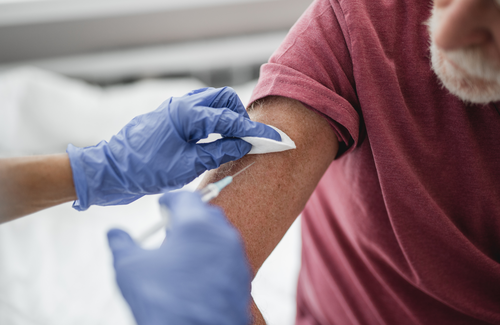
The Pfizer and Moderna vaccines against SARS-CoV-2 produce strong antibody responses in people with HIV and similar antibody and cellular immune responses in people with and without HIV, two studies published in the journals AIDS and Clinical Infectious Diseases show.
Although people with HIV have been prioritised for SARS-CoV-2 vaccination in some countries, it has been unclear whether immunosuppression caused by HIV could lead to weaker vaccine responses.
Earlier this year two research groups reported no differences in immune responses to the Oxford/AstraZeneca SARS-CoV-2 vaccine between people living with HIV and people without HIV.
The new reports cover the Pfizer and Moderna vaccines. They are both based on messenger RNA technology, which inserts messenger RNA into muscle cells. The cells produce a SARS-CoV-2 spike protein sequence, triggering the body to mount an immune response. Although there is no reason to think that mRNA vaccines are less effective in people with HIV, evidence from fully vaccinated people has been lacking.
Two separate research groups at Johns Hopkins University School of Medicine in Baltimore looked at responses to the Pfizer or Moderna SARS-CoV-2 vaccines in people living with HIV.
One group looked at the evolution of antibody responses after first and second doses in five people with HIV who received the Pfizer vaccine and nine people who received the Moderna vaccine. Study participants had a median age of 62 years, all but one was male, 12 of 14 were white and all had been taking antiretroviral treatment for at least six months. One had a detectable viral load of 35 copies/ml (with a CD4 count above 500) and two had CD4 counts below 200.
Blood samples for antibody measurement were taken a median of 21 days after the first vaccination (10 of 14 participants) and 29 days after the second vaccination (all 14 participants). A positive antibody response was registered by an antibody titre of 0.8 U/ml or above. The upper limit of the Roche assay measuring antibodies to the SARS-CoV-2 receptor binding domain was 250 U/ml. Antibody titres of 15-133 U/ml have been associated with virus neutralising activity in test tube studies.
The median antibody titre after the first vaccination in study participants was 76 U/ml. After the second vaccination, all participants except one had an antibody titre above 250 U/ml and the remaining participant had an antibody titre of 236 U/ml. The investigators say that antibody responses were similar to those observed in HIV-negative people and much better than those in immunocompromised people or those taking cancer treatments that affect lymphocyte production.
Almost all participants reported pain at the injection site after each vaccination. Systemic symptoms such as fatigue were common, occurring in around 60-70% of participants after each vaccination. Only one of these reactions was considered severe (headache in one participant after the second vaccination).
Another group at Johns Hopkins University School of Medicine looked at antibody and cellular immune responses. Antibodies are essential for preventing infection. As well as supporting antibody responses, cellular immune responses to SARS-CoV-2 seem to be critical for preventing severe illness.
They compared antibody and cellular immune responses in 12 people with HIV and 17 HIV-negative people between seven and 17 days after a second vaccination with the Pfizer vaccine. All but one person with HIV was Black, seven were women and all were on antiretroviral treatment. All had a CD4 cell count over 600, three had low-level viraemia (between 20 and 70 copies/ml) and the remainder were undetectable (below 20 copies/ml).
People with HIV did not have significantly lower antibody titres when compared to HIV-negative people, nor did they have lower levels of neutralising antibodies to the Alpha, Beta and Gamma variants first identified in the United Kingdom, South Africa and Brazil respectively. The study did not look at responses to the Delta variant that is now the predominant strain in the United Kingdom.
There was no difference in either the strength or breadth of cellular immune responses between people with HIV and HIV-negative people, even though people with HIV had a median age of 52 years, compared to 41 years in the HIV-negative group. However, the study authors say that more studies of vaccine responses are needed in people with lower CD4 cell counts to confirm that people with low CD4 counts respond as well to vaccination as people with HIV with robust CD4 counts.
Ruddy J et al. Safety and antibody response to two-dose SARS-CoV-2 messenger RNA vaccination in persons with HIV. AIDS, published online 8 July 2021.
doi: 10.1097/QAD.0000000000003017
Woldemeskel B et al. The BNT162b2 mRNA vaccine elicits robust humoral and cellular immune responses in people living with HIV. Clinical Infectious Diseases, ciab648, published online 22 July 2021 (open access).

